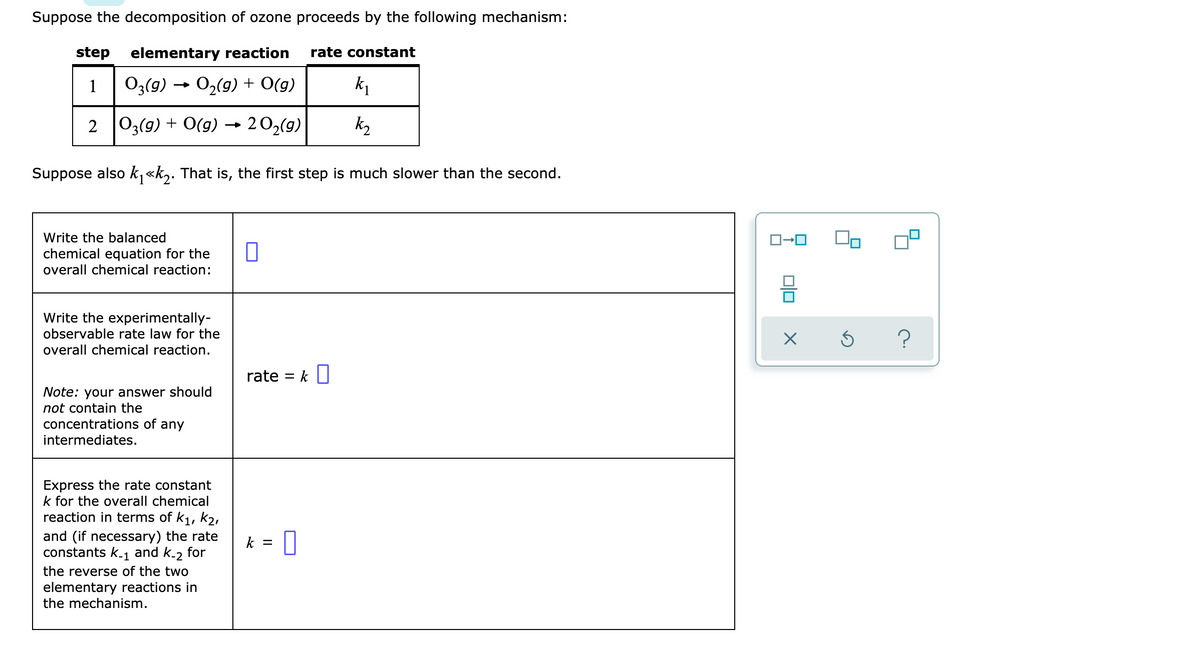Suppose the decomposition of ozone proceeds by the following mechanism: step elementary reaction rate constant 1 03(g) → O₂(g) + O(g) k₁ 2 03(g) + O(g) → 20₂(g) k₂ Suppose also k₁<
Suppose the decomposition of ozone proceeds by the following mechanism: step elementary reaction rate constant 1 03(g) → O₂(g) + O(g) k₁ 2 03(g) + O(g) → 20₂(g) k₂ Suppose also k₁<
Chemistry: Principles and Reactions
8th Edition
ISBN:9781305079373
Author:William L. Masterton, Cecile N. Hurley
Publisher:William L. Masterton, Cecile N. Hurley
Chapter11: Rate Of Reaction
Section: Chapter Questions
Problem 86QAP
Related questions
Question
TIA

Transcribed Image Text:Suppose the decomposition of ozone proceeds by the following mechanism:
step elementary reaction rate constant
103(g) 0₂(g) + O(g)
2 O3(g) + O(g) → 20₂(g)
Suppose also k₁<<k₂. That is, the first step is much slower than the second.
Write the balanced
chemical equation for the
overall chemical reaction:
Write the experimentally-
observable rate law for the
overall chemical reaction.
Note: your answer should
not contain the
concentrations of any
intermediates.
Express the rate constant
k for the overall chemical
reaction in terms of k₁, K₂,
and (if necessary) the rate
constants k-₁ and k-2 for
the reverse of the two
elementary reactions in
the mechanism.
0
rate = k
k =
k₁
k₂
0
1-0
X
5
?
Expert Solution
This question has been solved!
Explore an expertly crafted, step-by-step solution for a thorough understanding of key concepts.
Step by step
Solved in 2 steps with 1 images

Knowledge Booster
Learn more about
Need a deep-dive on the concept behind this application? Look no further. Learn more about this topic, chemistry and related others by exploring similar questions and additional content below.Recommended textbooks for you

Chemistry: Principles and Reactions
Chemistry
ISBN:
9781305079373
Author:
William L. Masterton, Cecile N. Hurley
Publisher:
Cengage Learning

Chemistry & Chemical Reactivity
Chemistry
ISBN:
9781337399074
Author:
John C. Kotz, Paul M. Treichel, John Townsend, David Treichel
Publisher:
Cengage Learning

Chemistry: Principles and Practice
Chemistry
ISBN:
9780534420123
Author:
Daniel L. Reger, Scott R. Goode, David W. Ball, Edward Mercer
Publisher:
Cengage Learning

Chemistry: Principles and Reactions
Chemistry
ISBN:
9781305079373
Author:
William L. Masterton, Cecile N. Hurley
Publisher:
Cengage Learning

Chemistry & Chemical Reactivity
Chemistry
ISBN:
9781337399074
Author:
John C. Kotz, Paul M. Treichel, John Townsend, David Treichel
Publisher:
Cengage Learning

Chemistry: Principles and Practice
Chemistry
ISBN:
9780534420123
Author:
Daniel L. Reger, Scott R. Goode, David W. Ball, Edward Mercer
Publisher:
Cengage Learning

Chemistry & Chemical Reactivity
Chemistry
ISBN:
9781133949640
Author:
John C. Kotz, Paul M. Treichel, John Townsend, David Treichel
Publisher:
Cengage Learning

Chemistry: The Molecular Science
Chemistry
ISBN:
9781285199047
Author:
John W. Moore, Conrad L. Stanitski
Publisher:
Cengage Learning

Principles of Modern Chemistry
Chemistry
ISBN:
9781305079113
Author:
David W. Oxtoby, H. Pat Gillis, Laurie J. Butler
Publisher:
Cengage Learning